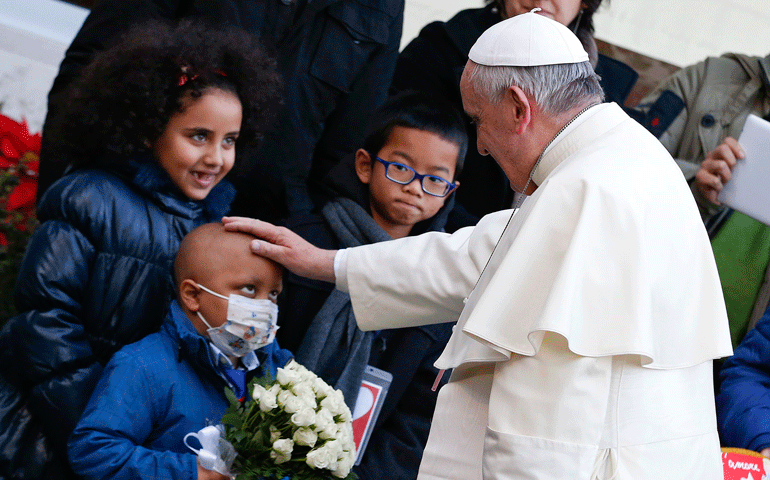
Pope Francis blesses a sick child as he arrives to visit the Bambino Gesù Hospital in Rome Dec. 21. (CNS/Reuters/Alessandro Bianchi)
Every so often a day rolls around that seems to perfectly sum up the arc of a story, and Saturday, Dec. 21, felt like one of those days in Pope Francis' ongoing reform campaign.
To set the scene, Francis had two big appointments on his calendar Dec. 21: the pope's annual year-end address to the Roman Curia and a visit to Rome's Bambino Gesù Hospital, which specializes in the care of sick children.
Most observers assumed the speech would bring the day's drama because it loomed as a sort of "state of the union" summation of Francis' vision for overhauling a sometimes dysfunctional bureaucracy in the Vatican. The hospital swing was largely a photo-op.
In the end, however, the pope's outreach to sick and suffering children actually felt like the main event -- and would seem to reveal something about how Francis understands genuine reform.
Back in September, Francis laid out a vision of reform in his celebrated interview with Jesuit publications.
"Structural and organizational reforms are secondary -- that is, they come afterward," the pope said. "The first reform must be the attitude. Ministers of the Gospel must be people who can warm the hearts of the people, who walk through the dark night with them, who know how to dialogue and to descend themselves into their people's night, into the darkness, but without getting lost. The people of God want pastors, not clergy acting like bureaucrats or government officials."
Dec. 21 drove home how much he meant this.
Given that a cleanup operation in the Roman Curia was a large part of the mandate Francis received from the cardinals who elected him, and given the fevered speculation in Rome about what further changes might be coming, many observers were anxious to see if Francis would drop some hints in his Saturday morning speech.
In the end, there was nothing like that.
When Pope Benedict XVI delivered his first Curia speech in December 2005, it ran 5,700 words, and offered one of the most memorable rhetorical tropes of his papacy. Benedict contrasted a "hermeneutic of discontinuity and rupture" that styles the Second Vatican Council (1962-65) as a repudiation of the church's past, with a "hermeneutic of reform" that accents continuity with earlier layers of tradition. In a sense, that speech was the intellectual blueprint for his entire papacy.
Francis' speech produced a few vintage Francis sound bites, such as his warning that the Vatican must not be a "ponderous bureaucratic customs house," bent on constantly "inspecting and questioning," as well as his plea to Vatican personnel to become "conscientious objectors" to a culture of gossip.
That, however, was attitudes language, and virtually everything had been said in various ways before.
The speech was also notable for its brevity, barely 1,000 words and 15 minutes to deliver.
The visit a few hours later to Bambino Gesù offered a study in contrast. Popes have visited hospitals before, of course, including brief stops at Bambino Gesù by John XXIII, Paul VI, John Paul II and Benedict XVI. Francis stayed almost three hours, greeting scores of children and their families.
Anyone following the pope couldn't help but draw the conclusion that the hospital visit was more important to him than the speech.
The stop produced another iconic image: a shot of Francis kissing a child bald from illness and wearing a surgical mask to ward off infection. Francis offered only one paragraph of formal remarks to the children and their parents. "Thank you for your dreams and your prayers," he said, referring to a basket with notes from the children presented to him.
"Let's offer them together to Jesus," Francis said. "He knows them best of all; he knows what's in the depths of our heart. Jesus has a special connection with you children. He's always close to you."
Projecting that attitude of closeness, both human and spiritual, to suffering people clearly seemed to be Francis' priority on Dec. 21. Presumably, the pope would say that's not a distraction from the heavy lifting of curial reform; instead, it's the basis for it.




